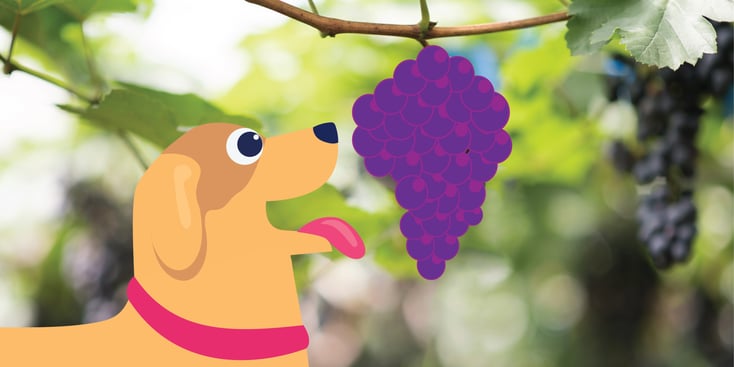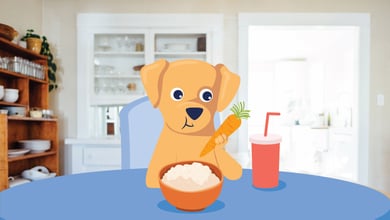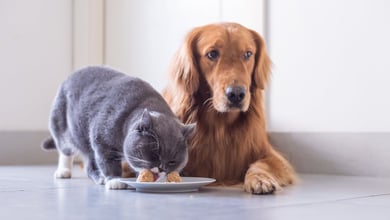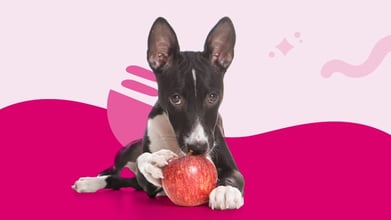Toxic Foods for Dogs: 10 Choices to Avoid

Table of Contents
Dogs are known to be our loyal companions, and as pet owners, it is our responsibility to take care of them. One way to do this is to make sure we avoid feeding them foods that can be toxic to their health. Unfortunately, some of the foods we humans love can cause severe harm to our furry friends.
These are the top 10 most toxic foods for dogs that pet owners should avoid to keep their pets healthy and safe:
1. Chocolate
The top food harmful to dogs is chocolate. Most of us are aware that it’s not a good treat for our dogs, but it’s still a common reason for dogs to take a trip to the vet!
Various natural chemicals found in cocoa – the most important of which is theobromine – can be toxic to dogs even in small quantities and can lead to seizures, irregular heartbeats, and death if left untreated.
Dark chocolate, which has a higher cocoa content, is more poisonous than milk chocolate. However, even chocolate-flavored baked goods – such as cookies or cakes, can still pose a risk to our pets.
Hassle-free In-Home Pet Sick Visits
When your pet isn't feeling well, the last thing you want is a stressful trip to the vet. Our in-home sick pet visits offer a calm, stress-free alternative.
2. Grapes, Raisins, Sultanas, and Currants
Closely following chocolate in our top list of foods dogs should not eat are grapes and their dried versions – currants, raisins, and sultanas. These can all cause kidney failure in dogs and unfortunately, there’s no way to know how many grapes it will take to trigger this.
Some dogs can eat a handful of raisins with no issues, while others will develop kidney failure after just two or three grapes. It’s not worth risking giving these fruits even as an occasional treat – they are a strict no-no for dogs.
3. Artificial Sweeteners(Xylitol)
Xylitol – an artificial sweetener – can cause serious problems to our dogs if ingested. Their bodies can mistake it for real sugar, causing their pancreas to release a massive amount of insulin – but there’s no actual sugar present for their body to use. This makes their blood sugar levels drop dangerously low, which can lead to tremors, seizures, coma, and death. It can also cause damage to their liver, too. Xylitol can be found in a range of products, including candy, chewing gum, dental products, and even peanut butter.
Always check the ingredients before giving your dog any human foods – and get them to a vet if they do eat something by mistake!
Related reading: How to Read a Dog Food Label
4. Onions and Garlic
Large amounts of onions and garlic can damage your dog’s red blood cells, leading to potentially dangerous anemia. It can also cause serious upset stomach, too – and that’s not even thinking about what their breath would smell like!
It takes quite a lot of onions or garlic to cause issues, so the main dangers are in foods where the powered forms are used, such as gravy granules. If you’re unsure, always consult a veterinarian for nutritional advice.
5. Caffeine
It might be a great pick-me-up for us humans, but we don’t want to share our morning coffee with our dogs. Caffeine can lead to hyperactivity, muscle spasms, seizures, and irregular heartbeats, and can sadly be fatal in high enough doses.
In addition to coffee, watch out for caffeinated soft drinks such as Cola, Mountain Dew, and energy drinks. Caffeine tablets can also be very dangerous.
6. Alcohol
Alcohol isn’t exactly great for our health, but it’s even worse for our dogs. Their smaller size means that it doesn’t take much of a drink for them to suffer serious side effects, and the alcohol can even be fatal in some circumstances.
The flavor of strong alcohol in spirits is off-putting for most dogs, but cocktails, beers, and hard ciders may mask the taste enough for curious dogs to try them. Be sure to keep alcoholic drinks well out of the reach of dogs!
7. Macadamia Nuts
Most nuts are quite rich and can often cause an upset stomach in our dogs, but Macadamia nuts are poisonous to dogs in significant quantities. Not only do they cause vomiting and diarrhea, but they can also lead to weakness, wobbliness, muscle tremors, and a raised body temperature. Thankfully this is rarely fatal, but it is still unpleasant for the dog and best avoided.
8. Dairy Products
While not technically toxic, dairy products such as milk, cheese, or yogurt can cause some severe gut upset in dogs. Most dogs are lactose intolerant, meaning that they do not produce the enzyme needed to digest some of the sugars found in milk. These sugars are instead fermented by the bacteria in your dog’s gut, leading to bloating, diarrhea, and extremely bad gas.
The more milk your dog drinks, the worse this effect will be – so if you are going to give your dog any dairy products, make sure it’s just a small amount!
9. Bones
Again, bones are not technically a toxin but are certainly a foodstuff that can be dangerous for dogs. Both cooked and raw bones can cause any number of different issues within the body, from breaking your dog's teeth or getting stuck in the throat to intestinal blockages or firm, spiky stools that can be excruciatingly painful to pass.
Sure, on many occasions, dogs may be able to enjoy a bone without any of these complications – but when the risks are so serious, do you really want to roll the dice?
10. Salt
Salty foods are often very appealing to dogs, but too much salt is not a good thing. Dogs who eat a large amount of salt in a short period of time can end up with salt poisoning – a serious condition that can be fatal without treatment.
Some dogs with certain health conditions should avoid any extra salt in their diet – for example, dogs with heart or kidney conditions, or epileptic dogs who are taking potassium bromide to treat their condition.
Keep high-salt foods out of the reach of dogs and be especially careful with homemade salt dough, which can be very dangerous to pets.
Conclusion
Many human foods are not good for our dogs and can cause anything from an upset stomach to a life-threatening illness. It’s best to stick to a complete and balanced diet that’s designed for dogs – don’t feel the need to go for something trendy like grain-free or raw. A few treats are fine – but stick to those designed for dogs or something plain like cooked chicken or vegetables.
If you think your dog may have eaten something toxic, consult a veterinarian immediately for advice.
Should My Pet Be Seen by a Veterinarian?
1. Have you noticed changes in your pet’s appetite?
2. Does your pet have diarrhea or loose stools?
3. Have you noticed changes in your pet’s thirst/water consumption?
4. Is your pet having accidents in the house?
5. Is your pet pacing and unable to settle?
6. Is your pet panting more than usual?
7. Is your pet whining or vocalizing more than usual?
8. Is your pet shaking more than usual?
9. Is your pet hiding or avoiding physical contact more than usual?
10. Is your pet more lethargic and sleeping more than usual?
11. Are you concerned about changes in your pet’s behavior?
12. Is your pet scratching their ears?
13. Is your pet licking their paws more than usual?
14. Does your pet have a rash?
15. Is your pet moving more slowly than usual or having a harder time getting up or down?
View Results
Should My Pet Be Seen by a Veterinarian?
1. Have you noticed changes in your pet’s appetite?
2. Does your pet have diarrhea or loose stools?
3. Have you noticed changes in your pet’s thirst/water consumption?
4. Is your pet having accidents in the house?
5. Is your pet pacing and unable to settle?
6. Is your pet panting more than usual?
7. Is your pet whining or vocalizing more than usual?
8. Is your pet shaking more than usual?
9. Is your pet hiding or avoiding physical contact more than usual?
10. Is your pet more lethargic and sleeping more than usual?
11. Are you concerned about changes in your pet’s behavior?
12. Is your pet scratching their ears?
13. Is your pet licking their paws more than usual?
14. Does your pet have a rash?
15. Is your pet moving more slowly than usual or having a harder time getting up or down?
Share Quiz





